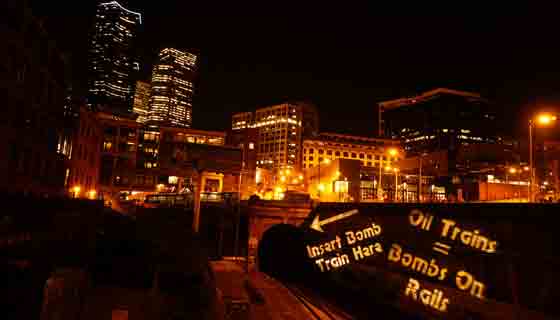Latest ‘bomb train’ incident predictable
Kathleen Sloan | The Hawk Eye, Burlington, Iowa May 11, 2015 Bakken.com
BNSF Railway carried the Hess Corp.-owned rail car, which carried highly volatile Bakken crude oil from North Dakota and appears to have followed the law.President Barack Obama weighed and rejected using executive authority to curb the transport of this explosive crude oil, rich in butane and propane, because he decided North Dakota state law should be the controlling authority. But the law North Dakota passed in December and went into effect just last month, only requires less than 13.7 pounds-per-square-inch vapor pressure inside the tanker, despite explosions at lower pressures.
That’s almost 40 percent more than the average vapor pressure among the 63 tanker cars that exploded July 6, 2013, at Lac-Megantic, Quebec. That disaster killed 47 people, some of whom could not be found because they were vaporized, and is driving recent federal and state rail car regulations.
According to an Albany, N.Y., Times Union investigation, the average vapor pressure among 72 tanker cars in the Lac-Megantic train was 10 psi.....
....Experts in various news articles and public comment submitted during the federal rule-making stated the way to make transport safe is to refine the crude before shipping. That would involve building refineries near the extraction point, which experts pointed out would be expensive.
In a Sept. 26, 2014, story, Railway Age contributing editor David Thomas applauded North Dakota for “using state jurisdiction over natural resources to fill the vacuum created by the federal government’s abdication of its constitutional responsibility for rail safety and hazardous materials.”
But Thomas admitted the state law on crude treatment would reduce the danger only slightly.
“Simply put, North Dakotan crude will have to be lightly pressure-cooked to boil off a fraction of the volatile ‘light ends’ before shipment,” Thomas said. “This conditioning lowers the ignition temperature of crude oil — but not by much. It leaves in solution most of the culprit gases, including butane and propane. Even the industry itself says conditioning would not make Bakken crude meaningfully safer for transportation, though it would make the state’s crude more consistent from one well to another.”
“The only solution for safety is stabilization, which evaporates and re-liquifies nearly all of the petroleum gases for separate delivery to refiners,” Thomas said.
He points out owners and shippers in the Eagle Fork formation in Texas, voluntarily stabilize their crude before shipping. It’s more volatile than Bakken crude..... more here
Firefighters' Union Says New Oil-By-Rail Rules Fall Short
Kate Sheppard HuffPost 05/05/15
WASHINGTON -- The largest union representing firefighters in North America said Tuesday that a new Department of Transportation rule for transporting oil by rail does not go far enough to enable firefighters to respond effectively in the case of an accident.Released on Friday, the new rule from the Department of Transportation's Pipeline and Hazardous Materials Safety Administration and the Federal Railroad Administration covers trains carrying oil and other highly flammable liquids. It includes new standards for how tank cars used to transport those liquids must be constructed, and it changes requirements for routing and speed. The DOT's description of the new rule also notes that it requires railroads to provide state, local and tribal governments with "a railroad point of contact for information related to the routing of hazardous materials through their jurisdictions."
It's that information-sharing part of the rule that has the union concerned. Its general president, Harold Schaitberger, wrote in an email that because time is so critical when responding to accidents, emergency personnel need information about what a train is carrying up front, instead of just having a point of contact to find out later.
.....The DOT's rule indicated that such disclosure might have "negative security and business implications." But Schaitberger said the lack of transparency could be deadly.
“Trains carrying combustible crude oil continue to move regularly through populated communities and pose a serious and immediate safety threat," said Schaitberger..... more here
State gets oil train reports via back door
While feds grant railways secrecy, new law requires disclosure by refineries
By
Lauren Dake, The Columbian May 9, 2015

No comments:
Post a Comment